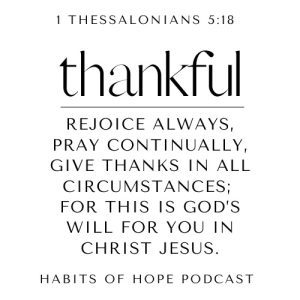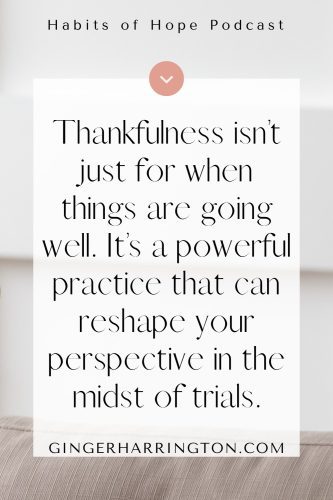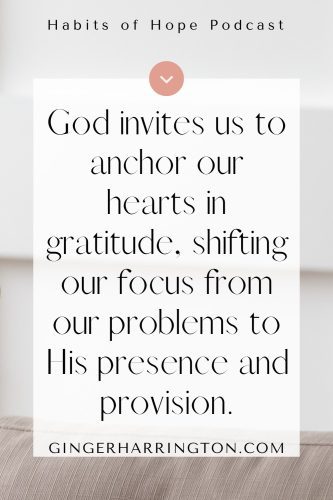Why does God call us to give thanks in all circumstances? Gratitude shifts our perspective, aligns our hearts with His presence, and strengthens our faith, even in life’s most difficult seasons. Giving thanks is more than a response to blessings—it’s a spiritual discipline that anchors us in hope and trust in God’s faithfulness. In this post, you’ll find options to watch, or listen to this content.
Have you ever been in a place where the last thing you wanted to do was give thanks? Maybe you’re in that place right now—facing financial stress, feeling overwhelmed with loss, or battling a health issue. As Thanksgiving approaches, it might feel counterintuitive to celebrate when so many hard things are happening in our world. But what if I told you that gratitude isn’t just for celebrating?

Giving thanks isn’t just for the good times; it’s an anchor that can help us hold onto hope, even in the most challenging circumstances. As Thanksgiving approaches, it’s a perfect time to reflect on how gratitude can be a powerful practice—even when life feels tough.
Thankfulness is a Habit of Hope
“Make gratitude your first response, not your last resort.”
Choosing gratitude, especially when life is hard, shifts our focus and opens us to God’s presence and peace. Gratitude becomes a lifeline that moves our hearts from despair to hope, reminding us of God’s faithfulness even in difficult moments. Rather than waiting for everything to be “right” before we’re grateful, we can make thankfulness an intentional choice in any situation.
As my co-host, Larissa says, “If we wait to feel grateful before we give thanks, we might be waiting a long time.” True gratitude, especially in difficult seasons, is gritty—it’s a choice to see God’s goodness even when life is hard.
The most popular quote from my book Holy in the Moment relates to this: “Not every moment is good, but God is good in every moment.” When we remember this truth, choosing this kind of “gritty gratitude” can make all the difference in transforming our hearts and minds when we feel overwhelmed.
Why God Calls Us to Give Thanks in All Circumstances
 The Bible tells us in 1 Thessalonians 5:16-18: “Rejoice always, pray continually, give thanks in all circumstances, for this is God’s will for you in Christ Jesus.”
The Bible tells us in 1 Thessalonians 5:16-18: “Rejoice always, pray continually, give thanks in all circumstances, for this is God’s will for you in Christ Jesus.”
God is not asking us to pretend that everything is fine. This passage isn’t suggesting we should discount our problems or ignore our challenges. Instead, it encourages us to anchor our hearts in gratitude, shifting our focus from our problems to God’s faithfulness.
God invites us to be grateful not for every situation but in every situation. This passage expresses God’s will for believers, and it’s not just about circumstances, but how we respond to them.
God invites us to anchor our hearts in thankfulness because it realigns our focus from our problems to His presence and provision.
If we’re tempted to believe that gratitude has become cliché, it’s important to remember that the Apostle Paul wrote these words. His life was filled with hardships, and yet, we can read of his consistent thankfulness in every letter he wrote.
God’s will refers to all three of these instructions, to rejoice always, to pray continually, and to give thanks in all circumstances. The words “always,” “continually,” and “in all circumstances” point to a way of living—consistent practices or habits in our daily life.
When we practice these habits of hope, gratitude becomes a natural part of who we are not just something we do. Prayer is the connection that empowers us to choose joy and thankfulness. The key here is “in Christ.” In our own strength, it’s all too easy to let our emotions get in the way of choosing gratitude.
This call to thankfulness aligns our hearts with God’s presence and allows us to experience His peace. Gratitude shifts our focus from our problems to God’s promises, reminding us that we are never alone.
How might choosing gratitude as a “first response” impact the way you handle challenges?
The Science of Gratitude: How It Impacts Our Brains and Mental Health
 Gratitude doesn’t just impact our faith; it transforms our minds and bodies as well.
Gratitude doesn’t just impact our faith; it transforms our minds and bodies as well.
Research shows that gratitude can reduce stress, lower symptoms of depression, and even rewire the brain for resilience.
According to cognitive neuroscientist Dr. Caroline Leaf, gratitude activates nerve growth factors in the brain, enhancing neuroplasticity and helping us reshape negative thought patterns into healthier ones. Here’s how gratitude affects us:
- Lowers Cortisol: Research by Robert Emmons, a leading gratitude researcher and psychologist, indicates that practicing gratitude can reduce cortisol levels, the stress hormone, by up to 23%. Emmons’ studies on gratitude are widely cited, and his book “Thanks!: How the New Science of Gratitude Can Make You Happier” provides a deep dive into these findings.
- Boosts Happiness: Studies show that gratitude can increase happiness levels by 25%, helping us feel more satisfied and fulfilled.
- Improves Resilience: Trauma survivors who practice gratitude report fewer symptoms of PTSD and depression.
- Rewires the Brain: Research by Dr. Caroline Leaf reports that practicing gratitude creates new neural pathways that reinforce positive thinking, making it easier over time to shift our perspective from what we lack to what we have.
- And Much More! For a comprehensive list of the benefits of thankfulness, check out this article 35 Scientific Benefits of Gratitude: Mental Health Research Findings in 2024
This rewiring of our brains makes gratitude more than just a feel-good exercise. It’s a way to create new, healthy thought patterns that strengthen our mental and emotional resilience. Choosing to be thankful shifts our focus from waiting for a solution to thanking God during the challenge. By grounding ourselves in thankfulness, we experience renewed peace and strength.
A Real-Life Example of Gritty Gratitude
To illustrate gritty gratitude in action, let’s look at Larissa’s personal journey. After losing her husband, she continued her daily gratitude practice, choosing thankfulness even during one of life’s hardest seasons. She describes this journey as a choice that grounded her in God’s presence and became a source of strength in her grief.
“When we hold fast to hope, we can be thankful that God is with us, even if we’re not thankful for what’s happening.” Her story reminds us that gratitude can be a bridge to resilience. God has used her example to inspire more gratitude in my life, especially when I’m tempted to whine, complain, or worry.
Practical Ways to Make Giving Thanks a Daily Habit
 Building a habit of gratitude doesn’t have to be complex or time-consuming. In our recent episode and blog post on the power of gratitude, we shared seven ways to practice gratitude. Here are some additional ways to cultivate thankfulness in your life:
Building a habit of gratitude doesn’t have to be complex or time-consuming. In our recent episode and blog post on the power of gratitude, we shared seven ways to practice gratitude. Here are some additional ways to cultivate thankfulness in your life:
- Start a Gratitude Text Group: Connect with friends or family by creating a group text dedicated to sharing three things you’re grateful for each day. This practice not only encourages you to focus on what’s good but also creates a positive space to share encouragement with others.
- Talk About What You Are Thankful For. Be intentional about bringing gratitude into your conversations. The more you practice gratitude, the more it will flow into your conversations. This is a natural way to bring God into your conversation, and it can serve as a powerful witness.
- Focus on Philippians 4:8 at the End of Each Day: Reflect on one thing that is “true, noble, right, pure, lovely, or praiseworthy” at the close of your day. This practice brings peace and helps you sleep with a grateful heart.
- Incorporate Gratitude into Prayer: Begin or end each prayer by thanking God for His presence and specific blessings. This small practice helps focus our minds on what’s good, even when life feels challenging.
- Try the “5-Finger Gratitude” Technique: Hold up your hand and touch each finger, naming one thing you’re grateful for with each. This quick and simple technique is perfect for moments when you need a reminder of God’s faithfulness.
Choose one of these gratitude practices and put it into action today. Gratitude isn’t just a fleeting feeling—it’s a spiritual discipline that cultivates trust in God’s presence and faithfulness in every situation. By choosing to be thankful, we shift our focus from waiting for solutions to experiencing God’s peace during challenges.
This life-giving habit strengthens hope, deepens faith, and reminds us that even in difficulty, God is with us every step of the way.
For more insights, encouragement, and tools, I invite you to listen to the full podcast episode and sign up for the free gratitude resources to support your journey into a lifestyle of gratitude.
30 Days of Giving Thanks
Cultivating a thankful heart doesn’t just happen. It takes intention and practice.Enjoy this fun and interactive workbook to release the power of gratitude in your life.
Resources Mentioned in the Podcast
If you’re looking for tools to help make gratitude a daily practice, here are some helpful resources from the podcast:
- Weekly Gratitude Sheets – A free download to help you keep track of daily blessings. Free with sign up for Larissa’s newsletter.
- Social Media Inspiration from Larissa – Follow “Grateful Chick” on social media for daily gratitude encouragement.
- Switch On Your Brain
Related Content
- Why Gratitude Matters More than You Think: How to Be More Grateful
- Gratitude Matters: 10 Truths and Tips for a Grateful Life
- Celebrate Gratitude with Ginger and Larissa
- Pondering Gratitude


 So glad you're here. I help busy women—gals like you— build healthy habits for living well with biblical wisdom and practical steps to deepen your faith, increase your hope, and thrive in your purpose.
So glad you're here. I help busy women—gals like you— build healthy habits for living well with biblical wisdom and practical steps to deepen your faith, increase your hope, and thrive in your purpose.



